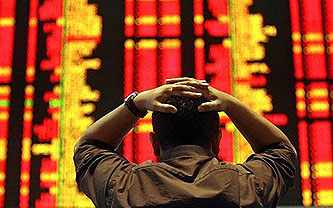The Wall Street Journal has a long story today about Thursday’s big stock market tank that roughly confirms the one I wrote about last Friday. In their version,  the market was already skittish over Greece and the euro when Universa, a hedge fund advised by Black Swan author Nassim Nicholas Taleb, placed a biggish bet that stock prices would fall. The guys on the other side of the bet sold stocks to hedge their position, and before long things had started to spin out of control:
the market was already skittish over Greece and the euro when Universa, a hedge fund advised by Black Swan author Nassim Nicholas Taleb, placed a biggish bet that stock prices would fall. The guys on the other side of the bet sold stocks to hedge their position, and before long things had started to spin out of control:
By 2:37 p.m., the overload seemed to have taken its toll on the NYSE’s Arca electronic-trading system. At that point, its rival, the Nasdaq, owned by NASDAQ OMX Group Inc., detected what it felt was questionable information in the data. It sent out a message saying it would no longer route quotes to Arca.
This step — known as declaring “self-help” — doesn’t happen often among the major exchanges. But in the coming minutes, the BATS exchange also stopped automatically routing orders to Arca.
For a crucial set of players — high-frequency-trading hedge funds — all this turmoil was becoming too risky to handle. One fear that would prove all too real was that in the extreme swings, some — but not all — trades would later be canceled, leaving them on the hook for unwanted positions.
….With the high-frequency funds either selling or pulling out of the market, Wall Street brokerage firms pulling back and the NYSE stock exchange temporarily halting trading on some stocks, offers to buy stocks vanished from underneath the market. Normally there can be hundreds of offers to buy the iShares Russell 1000 Growth Index exchange-traded fund, but at 2:46 p.m., there were just four bids north of $14 for a fund that had been trading at $51 minutes earlier, according to data reviewed by The Wall Street Journal.
Even if this turns out to be the right story, it still doesn’t explain everything. Universa’s trade only totalled $7.5 million, not really that big even against the background of an already agitated market. So how could a trade that size cause a trillion dollar meltdown? “It did point out that there is a structural flaw,” said Gus Sauter, chief investment officer at Vanguard Group, and that seems like an understatement. The Journal authors point out that high frequency trading has become so ubiquitous (accounting for two-thirds of all stock market volume) that in practical terms HFTs are now responsible for maintaining an orderly market. Unfortunately, they don’t have any regulatory responsibility for this, and when markets become disorderly they simply flee, causing the problems to become even worse. The solution isn’t yet clear, but we’d better figure out something before HFTs become 99% of the market.

















